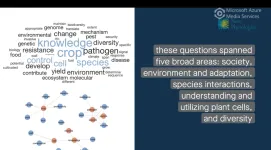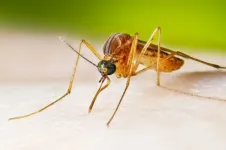Scientists identify 100 important questions facing plant science
An international panel of scientists have identified 100 of the most important questions facing plant science.
2023-03-16
(Press-News.org) What are the key research priorities that will help tackle the global challenges of climate change, the biodiversity crises and feed a growing population in a sustainable way? Ten years after these priorities were first debated and summarised by a panel of scientists and published in New Phytologist, the panel reflects on the changes to plant science and the progress made to address these research areas, published on 16 March in a Letter in New Phytologist.
To re-evaluate research priorities, a new panel was formed in 2022 to provide an international perspective on the important areas for plant science research. This project, led by Prof. Claire Grierson (University of Bristol, UK), is a novel piece of research that gathered over 600 questions about plant science, from botanically curious members of the public to scientific and industrial leaders around the world. A team of 20 plant scientists from 15 nations were assembled to identify 100 of the most important questions facing plant science.
These 100 questions are published on 16 March in a Viewpoint in New Phytologist and highlight how climate change, biodiversity loss, and interdisciplinary and international collaborations are critical global priorities across diverse plant science research fields. The study demonstrates how critically important plant scientists believe the fight against climate change is, highlights global disparities in science funding and showcases a diverse range of important future research topics.
This inclusive study demonstrates how a global community of plant scientists, with a wide range of expertise, view the strategic priorities for plant research and offers insight into how different areas of research are important to different global regions. The study emphasises how an inclusive, international exercise can be used to identify diverse research questions. As panellist Dr Shyam Phartyal (Nalanda University, India) said, “One of the most significant steps of this study is maintaining a high level of diversity – not only in question gathering but also in the selection of panellists from the Global South.”
Another panellist, Dr Ida Wilson (Stellenbosch University, South Africa), said “My work is solution driven and needs to directly address the challenges that farmers in South Africa and Africa face. As part of the Africa panel, I am also very proud of the African inputs, and grateful for the opportunity to have our voices heard. I mentor young scientists too, and the excitement the publication has generated is tangible”.
Prof. Claire Grierson said, “These two papers form a unique and valuable resource for researchers and newcomers to plant science, including collaborators on interdisciplinary projects, students and early career researchers, and for policy development”.
Together, these two papers provide an excellent introduction to how plant science is developing and the significance, range and depth of research that needs to be addressed.
Papers:
Armstrong, E.M., et al. (2023) One hundred important questions facing plant science: an international perspective. New Phytologist. doi: 10.1111/nph.18771
Larson, E.R., et al. (2023) One hundred important questions for plant science – reflecting on a decade of plant research. New Phytologist. doi: 10.1111/nph.18663
Further information for Editors
This study was funded by the Bristol Centre for Agricultural Innovation.
About New Phytologist
New Phytologist is a leading international journal focusing on high quality, original research across the broad spectrum of plant sciences, from intracellular processes through to global environmental change. The journal is owned by the New Phytologist Foundation, a not-for-profit organisation dedicated to the promotion of plant science. https://www.newphytologist.org/
About the University of Bristol
The University is ranked within the top 10 universities in the UK and 61st in the world (QS World University Rankings 2023); it is also ranked among the top five institutions in the UK for its research, according to analysis of the Research Excellence Framework (REF) 2021; and is the 3rd most targeted university by top UK employers.
The University was founded in 1876 and was granted its Royal Charter in 1909. It was the first university in England to admit women on the same basis as men.
The University is a major force in the economic, social and cultural life of Bristol and the region, but is also a significant player on the world stage. It has over 20,000 undergraduates and over 7,000 postgraduate students from more than 150 countries, and its research links span the globe.
END
ELSE PRESS RELEASES FROM THIS DATE:
2023-03-16
LOS ANGELES — More than 37 million Americans have diabetes, and approximately 90-95% have Type 2 diabetes.
Diabetes is a chronic condition where the body does not produce or effectively use insulin. A lack of insulin leads to raised blood glucose (sugar) levels, which can cause heart disease and stroke, kidney disease, nerve damage and other severe complications.
Keck Medicine of USC has launched a Phase 2 clinical trial investigating the effectiveness of a new outpatient, nonsurgical endoscopic procedure in stabilizing blood glucose levels for patients.
“Currently, the only treatment for diabetes ...
2023-03-16
New UC Riverside research makes it likely that proteins responsible for activating mosquito sperm can be shut down, preventing them from swimming to or fertilizing eggs.
The study could help control populations of Culex, the common house mosquito that transmits brain-swelling encephalitis and West Nile Virus.
“During mating, mosquitoes couple tail to tail, and the males transfer sperm into the female reproductive tract. It can be stored there awhile, but it still has to get from point A to point B to complete fertilization,” said Cathy Thaler, UCR cell biologist and the study’s first author.
Key to completing that journey are the specialized proteins secreted ...
2023-03-16
Arlington, Va., March 16, 2023 – Findings from a new study published in the American Journal of Infection Control (AJIC), highlight perceptions of and barriers to reliable hand hygiene among specific clinician subgroups. The results, from the first study of its kind, provide insights that can be used to design and implement future, targeted interventions to optimize hand hygiene reliability among medical professionals.
“While prior studies focused on challenges to hand hygiene reliability by healthcare role, we believe our study is the first to highlight key differences in perceived barriers ...
2023-03-16
Many people keen to reduce their meat consumption are turning to substitutes made of legumes packed with protein, vitamins, and fiber. But allergies to legumes like soy or peanuts are both common and dangerous. Are patients allergic to particular legumes at risk from meat-free proteins made of legumes even if they contain different legumes? Dr Mark Smits and a team of scientists at University Medical Center Utrecht set out to investigate.
“Both protein consumption and the world’s population are increasing which leads to an urgent demand for sustainable ...
2023-03-16
A small nucleus in the brainstem called locus coeruleus (literally the “blue spot,”) is the primary source of a major neuromodulator, norepinephrine (NE), an important mediator of the ‘fight or flight’ response in animals. However, very little is known about the local connections of this small albeit critically important group of neurons. A recent pioneering study published in eLife from the laboratory of Dr. Xiaolong Jiang, investigator at the Jan and Dan Duncan Neurological Research Institute (Duncan NRI) ...
2023-03-16
More donated hearts could be suitable for transplantation if they are kept functioning within the body for a short time following the death of the donor, new research has concluded.
The organs are kept functioning by restarting local circulation to the heart, lungs and abdominal organs – but, crucially, not to the brain – of patients whose hearts have stopped beating for five minutes or longer and have been declared dead by circulatory criteria (donation after circulatory death, or DCD).
It is hoped that this technique could increase the number of usable donated hearts by as much as 30% in the future, helping address ...
2023-03-16
**Note: the release below is a special early release from the European Congress of Clinical Microbiology & Infectious Diseases (ECCMID 2023, Copenhagen, 15-18 April). Please credit the congress if you use this story**
Embargo – 2301H UK time Wednesday 15 March
A review from WHO on the number of new antibiotics currently in the pipeline shows that just 12 new antibiotics have entered the market in the five years from 2017-21. And there are far too few (just 27) under development in clinical trials against pathogens considered critical* by WHO such as Acinetobacter baumannii and Pseudomonas aeruginosa. ...
2023-03-16
Sophia Antipolis, 16 March 2023: Sleeping less than five hours a night is associated with a 74% raised likelihood of developing peripheral artery disease (PAD) compared with seven to eight hours. That’s the finding of a study published today in European Heart Journal – Open, a journal of the ESC.1
“Our study suggests that sleeping for seven to eight hours a night is a good habit for lowering the risk of PAD,” said study author Dr. Shuai Yuan of the Karolinska Institute, Stockholm, ...
2023-03-16
A new analysis of global rankings of life expectancy over seven decades shows the UK has done worse than all G7 countries except the USA. Researchers writing in the Journal of the Royal Society of Medicine say that while UK life expectancy has increased in absolute terms over recent decades, other, similar countries are experiencing larger increases.
In 1952, when Queen Elizabeth II came to the throne, the UK had one of the longest life expectancies in the world, ranking seventh globally behind countries such as Norway, Sweden and Denmark. ...
2023-03-16
The Tasmanian devil roams the island state of Australia as the apex predator of the land, feeding on whatever it pleases as the top dog – or the top devil. But some of these marsupial scavengers could be starting to miss out on a few items from the menu.
According to a study led by UNSW Sydney, living in human-modified landscapes could be narrowing the diet of the Tasmanian devil. The research, published recently in Scientific Reports, suggests devils have access to vastly different cuisines depending on the type of environment they live in.
“We found Tasmanian devil ...
LAST 30 PRESS RELEASES:
[Press-News.org] Scientists identify 100 important questions facing plant science
An international panel of scientists have identified 100 of the most important questions facing plant science.




